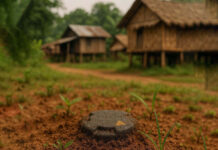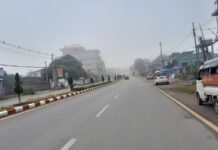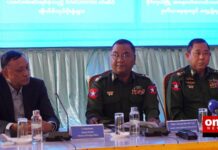As T Khun Myat, an independent MP formerly from Union Solidarity and Development Party (USDP), is appointed to become House speaker, Win Myint, the ex-House speaker is ready to be ushered into the presidential seat, left vacant by President Htin Kyaw’s resignation, the usual status quo equilibrium between the country’s recently empowered civilian leaders and its long-established military or Tatmadaw would be maintained, is no more tenable.
This means that these two poles represented by Commander-in-Chief Min Aung Hlaing, and the National League for Democracy (NLD) boss Aung San Suu Kyi, who has ruled above the President as State Counselor since the last elections, would be definitely geared to move for a change. In other words, with the 2020 election season drawing nearer, the parties need to be clearly spelling out their political positions so that profound choice could be made by the electorate.
Suu Kyi’s position is to maintain the NLD’s absolute majority from the 75% parliamentary seats like during the last election in 2015, while Min Aung Hlaing, whose ambition is to become President nominated by the military bloc, made up of the USDP and 25% Tatmadaw’s appointed-allotted MP seats within the parliament.
The ex-President Htin Kyaw on 71st Anniversary Union Day in February made known the NLD goal to amend the 2008 military-drafted constitution to be more federal and even used the much controversial terms “Federal Democratic Union”, which the Tatmadaw is not ready to accept it.
 Besides, State Counselor Aung San Suu Kyi in the NLD’s statement on the same Union Day occasion said: “Panglong Agreement is not only an agreement written on the paper but it is the promise signed (ingrained) in the heart,” according to the report of Myanmar Times Burmese language report.
Besides, State Counselor Aung San Suu Kyi in the NLD’s statement on the same Union Day occasion said: “Panglong Agreement is not only an agreement written on the paper but it is the promise signed (ingrained) in the heart,” according to the report of Myanmar Times Burmese language report.
Panglong Agreement of 1947 is seen by the ethnic nationalities as a treaty between them and the Burmese state to form a voluntary union together after the British left in 1948.
Thus, it is fair to conclude that the NLD regime would have to now fulfill its election campaign’s constitutional change promises and not duck behind the usual facade of peace first, constitutional amendment later.
And as everybody knows, the Tatmadaw and its Commander-in-Chief’s position are to protect the 2008 constitution and keep it in tact, allowing only cosmetic changes which do not in anyway compromise its political edge and privileges.
As a point man of the Tatmadaw, Min Aung Hlaing is entrusted to protect its mother organization and the top brass and has been doing just that since he became the Commander-in-Chief in 2011.
His political conviction
Min Aung Hlaing’s political conviction is the survival of his military group first and foremost, which is inseparably and intricately linked to the 2008 constitution carefully drafted by the Tatmadaw. This is underpinned by the three national objectives and the six peace process guidelines of the military.
The three national objectives are non-disintegration of the Union, non-disintegration of national solidarity, and perpetuation of sovereignty.
Min Aung Hlaing has always insisted that the peace process continue in line with the Tatmadaw’s six-point policy, in which ethnic leaders must agree “to avoid placing a heavy burden on local people, to strictly abide by the existing laws, and to march towards a democratic country by the 2008 Constitution,” among others.
In a nutshell, Min Aung Hlaing, rightly or wrongly, considers the Tatmadaw to be the sole protector and savior of the country and enforcer of the “discipline-flourishing democracy,” which literally means “democracy” guided by the military leadership, according to its prescription.
Most important for him though is his core commitment in the realization of what he called a “standard army”, equipped with modern arsenal and trained soldiers, coupled with effective military logistics, dominated by the Bamar majority as usual and not a federal army formation as demanded by the ethnic armed organizations (EAOs), where their forces would be allowed to become part of the national army and the rights to be stationed in their respective ethnic states.
Implementation of his strategy
As the military bloc made way for the NLD majority government following its landslide election victory at the end of 2015 and ushered into power in March 2016, the Tatmadaw has to refine its strategy to be able to maintain its supremacy position in Myanmar’s political landscape.
It seems to have employed various approaches to continue maintaining its political edge which includes blocking the constitutional amendments, manipulation and delaying the ongoing peace process, keeping the war flames on, and stoking Islamophobia.
The blockage of constitutional amendments has been the key to preserve the Tatmadaw’s supremacy role and as such the NLD’s efforts during its opposition time in Thein Sein’s USDP era and even in NLD majority government times have failed to amend any meaningful Articles to move the country towards real democratization.
When the NLD came to power in 2016, Min Aung Hlaing made it clear that he won’t agree to amend Article 436 to lower the 75% vote ceiling to make it easier for the constitutional amendments and also would not waive the Article 59(f) that would enable Suu Kyi to become President. According the Article anyone with a foreign spouse cannot occupy the highest office, which was why a position akin to Prime Minister called State Counselor was created particularly for Suu Kyi.
In delaying the peace process the Tatmadaw rejects the all-inclusiveness participation of the Ethnic Armed Organizations (EAOs), coupled with offensive attacks on them in Shan, Kachin, Chin and Arakan states under the pretext of safe-guarding national unity, sovereignty, territorial integrity and natural resources.
And it is strange that the Tatmadaw is playing a double role of negotiator and as well enforcer of the governmental legal frame when in fact they are the same and main issues which are in argument and need to be resolved in the peace negotiation process. They are none other than the Bamar-dominated government sole ownership of sovereignty versus shared-sovereignty from the perspective of the EAOs; and likewise, the resources-sharing which the ethnic nationalities are not in agreement that the government maintains sole monopoly.
While the blockage of constitutional amendments, peace process manipulation and delaying tactics are working perfectly, the stoking of Islamophobia aimed at Rohingya in Rakhine state has turned out to be devastating and negative for the Tatmadaw.
Originally, the Rohingya crisis and its final solution implementation is aimed to gather public support by making use of the racist populist policy and at the same time getting rid of the Rohingya, which Min Aung Hlaing labeled it as the left over “unfinished business” from colonial era. He might have believed that his heavy-handed ethnic cleansing undertaking, would be blamed just on Suu Kyi and he would go Scot-free.
But it turned out differently as expected as they both are on the receiving ends of international anger and condemnation and now targeted sanctions on some of the Tatmadaw’s Generals from the West is becoming a reality. Lately, Min Aung Laing himself is even accused of crime against humanity and the most responsible point man to answer to the International Criminal Court (ICC) in The Hague.
Outlook
Looking at the situation with an eye on the upcoming 2020 national election, it is hard to believe that maintenance of the present status quo will last any longer, even though both parties have to weather and overcome the present international anger and condemnation for the mistreatment of the Rohingya, now depicted as ethnic cleansing and crime against humanity by the UN High Commissioner for Human Rights and the UN Secretary General, officially short of naming it an act of genocide.
The likely scenarios or political configuration that could come out in the aftermath of 2020 would be: the similar situation of 2016 NLD majority governmental setup, although its winning percentage could be reduced; the NLD-ethnic political parties coalition government; the USDP-Tatmadaw coalition government; and the USDP-Tatmadaw-ethnic political parties coalition government, just to name a few setup possibilities.
As suggested earlier, the NLD main thrust to gather vote will be to show that it is doing something to amend the constitution according to its election campaign promises and Min Aung Hlaing’s task is to protect the 2008 constitution and uphold its group survival staying power by chipping away as much votes as possible from the NLD and ethnic camps.
And with the 25% Tatmadaw’s appointed and allotted MPs’ seats, the military bloc only need to achieve 26% votes to form the government. This time around, the Tatmadaw could cash in the ultra-nationalist votes in the aftermath of recent Rohingya’s expulsion move, which might find sizable electorate migration from traditional NLD voters, and the newly formed 1988 era old student’s political party perhaps also chip away some of the NLD votes. Thus, there is possibility that the military bloc could stage a come back.
As for the NLD, the public opinion is not as one-sided, simple and clear as it was in 2015 election. This time around, the ethnic political parties are more organized by forming alliances and even fusion of several political parties into single parties to contest the national election. Students political party and other Bamar political parties are now also better organized to take away some of the NLD votes. Thus, the NLD might likely lose its absolute majority status and could even find itself sitting on the opposition bench.
So far as Tatmadaw’s boss Min Aung Hlaing is concerned, the plan to block constitutional amendment within the parliament by his Tatmadaw representative followers; manipulation of peace process negotiation; keeping the war flames on, including battle field’s territorial gains through military onslaught in ethnic states; and exploitation of the situation in Rohingya crisis through hatred and Islamophobia to gather more votes from the population would work to his advantage or not is anybody’s guess.












Leave a Comments